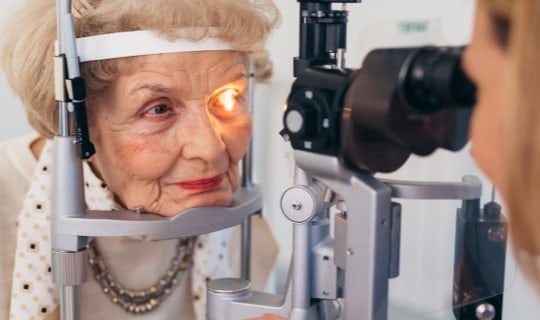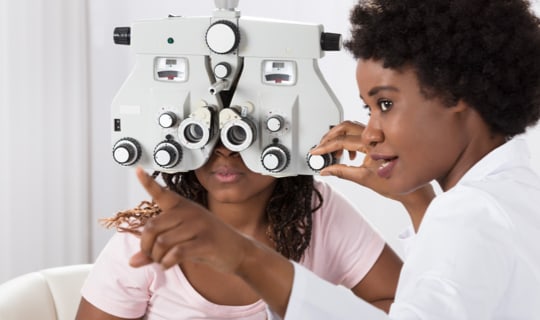Protect Your Sight with Regular Eye Exams
Your eyes are your windows to the world—regular eye exams are the best way to help keep those windows stay clear and strong.
Even if you’re not experiencing obvious symptoms of eye disease, it’s still important to visit your optometrist regularly. Many eye diseases don’t show symptoms until they’ve already progressed to their later stages. By the time you notice changes in your vision, you may have already suffered permanent vision loss.
Your vision is priceless; don’t put it at risk. Book your next comprehensive eye exam today.

We’re at the Forefront of Vision Research
Dr. Teller is a proud member of the National Advisory Eye Council, board-industry members who inform the National Eye Institute (NEI) on current and upcoming research training in vision medicine. As our client, you get the benefit of our team’s knowledge and care.
How is NEI working to improve vision medicine? Check out the video below on the NEI Audacious Goals Initiative—a group of regenerative medicine professionals, using genetic and growth factor therapies to regenerate retinal ganglion and photoreceptor cells to restore vision.
What Are Some Common Eye Diseases?
Cataracts
Cataracts are a normal part of the aging process, occurring when our lenses become cloudy and opaque. Though many of us will develop cataracts as we age, factors such as diabetes, smoking, UV exposure, and excessive alcohol consumption increase our chances of developing cataracts at a younger age.
In their early stages, your optometrist may be able to suggest workarounds to maximize your vision, but as cataracts grow, your vision will become more obscured. The only treatment for cataracts is surgery.
Cataract surgery is the most commonly performed surgery in the United States and is a minimally invasive outpatient procedure. During the surgery, your surgeon will make a small incision and remove your clouded lens, replacing it with a clear, artificial lens.
Eye Rx is partnered with a network of skilled surgeons in the Metropolitan D.C. area and can provide you with a referral.
Age-Related Macular Degeneration
Age-Related Macular Degeneration (AMD) is the most common cause of vision loss in patients over the age of 50. AMD develops when the macula (the portion of your retina that mostly handles color perception and detailed vision) begins to degenerate. As AMD progresses, you can start to develop blind spots in the center of your vision.AMD comes in 2 forms:
- Dry AMD is the most common form and is typically less serious than wet AMD. Dry AMD occurs when lipid deposits, called drusen, slowly accumulate under your macula. This accumulation damages the light-sensitive cells in your macula, which can cause permanent vision loss or even blindness. There is no cure for dry AMD, but studies suggest that progression can be slowed by consuming nutrients and antioxidants including vitamin C, vitamin E, lutein, zeaxanthin, and zinc.
- Wet AMD is much rarer than dry AMD, and progresses more quickly. Wet AMD occurs when new blood vessels grow underneath your macula. These new blood vessels are weaker, and can leak blood and other fluids, causing permanent damage to the light-sensitive macula cells. There is no cure for wet AMD, but its progression can be halted using intraocular injections.
Though there is currently no cure for either form of AMD, early detection means your optometrist may be able to slow the progression of the condition and preserve your vision.
Conjunctivitis (Pink Eye)
Conjunctivitis, commonly known as “pink eye,” occurs when the conjunctiva (the thin, transparent film that covers the white of your eye) becomes inflamed and irritated. This inflammation causes your blood vessels to dilate, giving your eyes the red and bloodshot look that gave pink eye its name.
Conjunctivitis has 3 main forms:
- Allergic conjunctivitis is triggered by allergens such as dust, pollen, and animal dander and is not contagious. Symptoms can be managed using antihistamines.
- Bacterial conjunctivitis is caused by a bacterial infection and is highly contagious. This form of conjunctivitis will need to be treated by your optometrist.
- Viral conjunctivitis is caused by a virus, and like the common cold, it does not require treatment. However, it is still highly contagious, so you should avoid close contact with others and follow your optometrist’s instructions carefully.
Glaucoma
Glaucoma occurs when your optic nerve becomes damaged, typically as a result of high pressure inside your eye. However, glaucoma can occur even if your intraocular pressure is within normal range; a condition called normal-tension glaucoma. Glaucoma is most commonly found in patients over 60.
Your body relies on your optic nerve to transmit visual information from your eyes to your brain, so glaucoma can compromise your vision and cause blindness if it is left untreated.
Glaucoma does not typically exhibit symptoms until you have already begun to experience permanent peripheral vision loss. That means many individuals with glaucoma may not be aware they have the condition. Glaucoma is treatable, but early detection is vital. Glaucoma can be controlled using medicated eye drops, and there are laser options that can alleviate eye pressure.
All comprehensive eye exams performed at Eye Rx include glaucoma testing, which is performed using an Ocular Response Analyzer and a Goldmann applanation tonometer.
Retinal Tear or DetachmentGoldman Application Tonometer
Eye floaters occur when tiny pieces of protein called collagen float around in the vitreous, the clear, gel-like fluid inside your eye. Floaters are typically harmless and become more frequent as we age. This is because the vitreous becomes less gel-like and more fluid, allowing floaters to move around more freely and making them more noticeable.
However, a shower of floaters or sudden bright flashes of light are cause for concern as they may indicate that your retina has become torn or detached. Retinal detachment is a serious condition that requires immediate medical attention to avoid vision loss.
Let’s Get Proactive with Your Eye Care
For more information about eye disease diagnosis and management, book an appointment online, or give us a call at our Chevy Chase office or our Washington DC office.
We also welcome walk-in patients.
Our Brands









Our Locations
Chevy Chase
We’re located just off North Park Avenue along Shoemaker Farm Lane. If you have any trouble finding our office, don’t hesitate to give us a call!
- 4600 North Park Ave., Plaza North
- Chevy Chase, MD 20815
VIEW OUR HOURS
- Monday: 8:00 AM – 5:00 PM
- Tuesday: 8:00 AM – 5:00 PM
- Wednesday: 8:00 AM – 5:00 PM
- Thursday: 8:00 AM – 5:00 PM
- Friday: 8:00 AM – 5:00 PM
- Saturday: Closed
- Sunday: Closed
Washington DC
Find us in the heart of downtown, just off K Street. We’re located in the Davis Building next to Chase Bank. If you have any trouble finding us, feel free to give us a call!
- 1629 K St NW #502
- Washington, DC 20006
VIEW OUR HOURS
- Monday: 8:00 AM – 5:00 PM
- Tuesday: 8:00 AM – 5:00 PM
- Wednesday: 8:00 AM – 5:00 PM
- Thursday: 8:00 AM – 5:00 PM
- Friday: 8:00 AM – 5:00 PM
- Saturday: Closed
- Sunday: Closed








